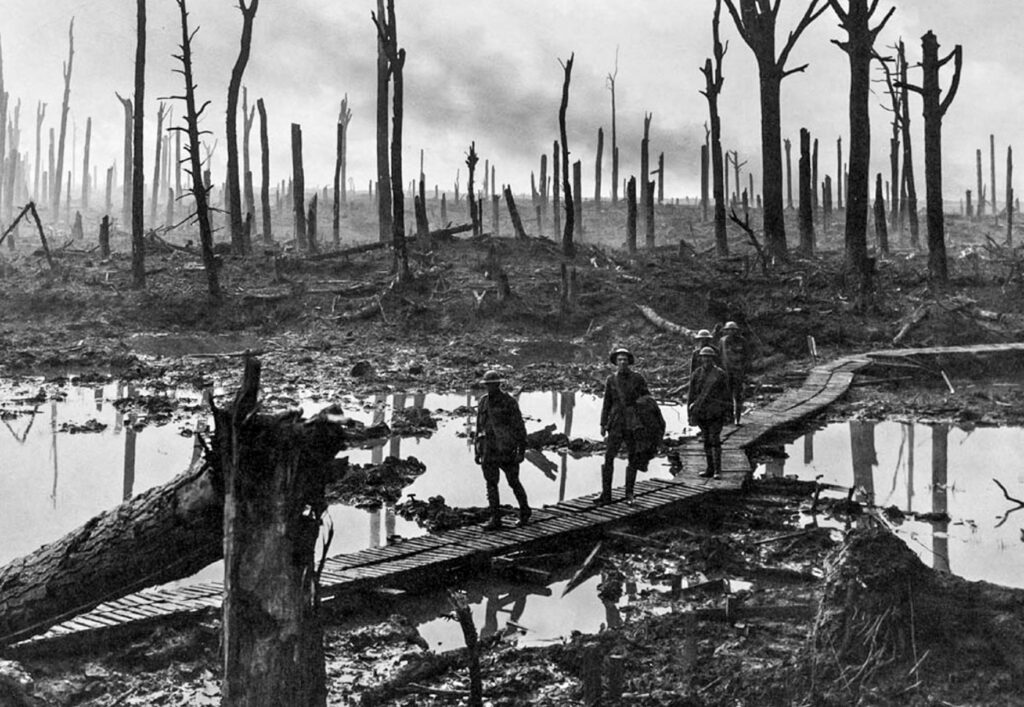
Introduction
“War was always here. Before man was, war waited for him. The ultimate trade awaiting its ultimate practitioner.”
― Cormac McCarthy, Blood Meridian, or, the Evening Redness in the West
It’s tough to convey a point, at times. Porteus wrote “a murder makes a villain, a million [deaths make] a hero…” I think that’s as close as I can come to emphasizing the human condition as it relates to war. The quote goes on, but for now, it’s not important. Establishing that what is taboo to the individual becomes glorified amidst the unflinching certainty of the mob is. Among honors, few have a higher place than that of the warrior, and among horrors, few have a more dubious distinction than that of the war.
There occurred, this time a little over a hundred years ago, a moment in which war changed. For time immemorial, wars were chained to logistics, and battles won and lost not only by the skill of the men at arms, the strategy of the commanders, and the favor of luck, but by who could field the larger, better force… and as importantly, maintain it. World War I coincided with something that no previous war had – a boom of innovation and industrialization. World War I was caught, a lynchpin moment in history in which wars previous relied on human capacity, and those to come would rely on industrial base.
More Importantly…
The reason I bring this up isn’t to wax philosophical about old wars. It’s to say the following: The pace of industrialization that war encountered far outpaced the strategists persecuting the wars. While this is a reductionist view of things, war of attrition remained long after the necessity of maneuver warfare. The strategists committed to trenches in the face of mustard gas, infantry charges across fields of concertina wire under withering machine gun fire, and equine cavalry came face to face with mechanized tanks. Why?
Simple: Paradigm paralysis. They were trying to fight the next war with the last war’s tactics… but innovation didn’t wait. We see this fractal truth happen across protective industries: solutions lag behind problems.
In the case of World War I the outcome was, predictably, tens of millions dead… and I’d be remiss if I failed to mention that about half of those were civilian casualties. Wars do not care if you want to be involved.

Rifle, spear, gas mask, horse.
History Now
Context out of the way, it’s time to start discussing the strategic shortfalls of our current war plans. Not because I care, let me be upfront: I’m no strategic planner, military officer, or war-hawk. We need to discuss this because we’re at a juncture where this is set to happen again, and the lack of preparedness on behalf of our strategic planners is absolutely going to spill into the civil domain, and, as is typical, many citizens will lose their lives. The next war will not be like the last. It will not be determined by airpower, troop movements, and good strategy between large forces (though those things will always be important). It will be determined by infrastructural resiliency and the ability to adapt to rapidly changing circumstances as we plummet backwards towards a standard of living that would have been familiar to those in the 1890’s.
This is a bold claim, but here’s the reason: leading up to current times, we’ve had a REALLY good idea of what war was for the last 1400 years or so. The transition was slow from swords and scimitars to rifles and cannons. The tactics and strategy had time to evolve with the technology. By the time it our best and brightest decided they could split atoms and destroy cities, we had a firmly entrenched concept of “just war”, and more importantly, there was fear about abusing the weapons… especially in the wake of the humanitarian catastrophe that was Hiroshima and Nagasaki.
In short, we knew what the word “bomb” meant when we split the first atom.
We do not know how the confluence of unrestricted warfare doctrine, the cyber domain, and advanced artificial intelligence will shape the a concept of battlespace that now includes everyone and everything, and can be piloted semi-autonomously.
What’s next?
The use of nukes, and indeed, war in general, is the purview of those who are fine with suffering so long as they profit. Maybe they’re malicious, maybe they just don’t know any better. Who knows. But the long and short of the story is the power to disrupt power grids, to perform surveillance, to run drones, to cause economic mischief, to dox those in sensitive positions, and to interfere with the integrity of information is now decentralized… and it’s about to become industrialized.
Advancing AI will utterly change the nature of conflict, and dudes debating which camo pattern is the superior pairing for their preferred rifle and “AO” (lol) is laughably out of touch. War, has always changed, despite what Fallout narratives tell you, and it’s about to undergo another change that’s so rapid that we cannot anticipate how it will impact the world.
The dudes out there thinking in terms of infantry tactics are the rough equivalent of Field Marshal so and so committing his boys to a trench while the enemy is developing mustard gas.
With that said, there’s the possibility that we will see a slow enough ramp up that world powers recognize the the absolutely destructive power that exerting soft force in the cyber domain will have. It’s possible they’ll pump the brakes. The concern there is that means that we will likely see the advances made in AI turned inward against populations to control information and access to critical resources.

Shell shock.
There are also strategic leaders who see what’s coming. Drone swarms were within sight as a looming threat that could provide low cost, high lethality offensive tools seven years ago when that article was written. I have no faith in our current DOD leadership, but there remain some career officers who aren’t principally politicians, and war has a tendency to flush the chumps.
Look at the cat above. Imagine shell shock in the age of “Mm ice cream, so good“, Insta-fit influencers and Neuroqueer twitch streamers, and it’s clear we’ve got a generation or two of automatons who couldn’t pass a Voight-Kampf. Meanwhile, it’s getting harder to tell if ChatGPT is sentient, while the humans work diligently to make the word meaningless. The mental fortitude it requires to adapt to such a sudden paradigm shift is not to be taken lightly. Mental health in the West is already fracturing, and the biggest challenge we’re facing is boredom, high inflation, and political malarkey. Soft totalitarianism has already drawn the battle lines, and the trouble hasn’t even really started. Taken to it’s logical conclusion, we’re headed for a historical inflection point, and it’s going to be a big one.Porteus’s quote ends with “princes were privileged to kill, and numbers sanctified the crime.” The end of that era is within sight, for it’s no longer princes, nor is the domain about directly killing. The moral ambiguity of crippling systems that cause, as second and third order impacts, mass death is not fully appreciated. If anything, it plays to the modern affect of shirking responsibility and saying “we’re looking into it.”
Taken to it’s logical conclusion, we’re headed for a historical inflection point, and it’s going to be a big one.
Cheers,
Aaron






